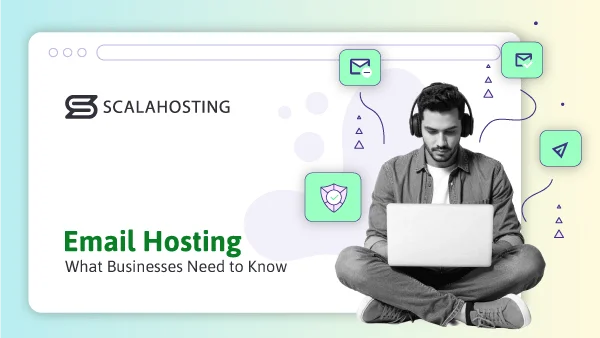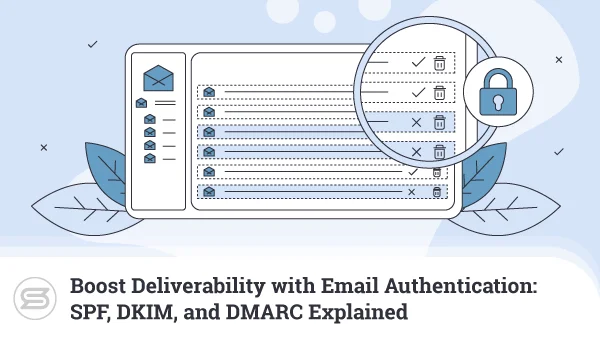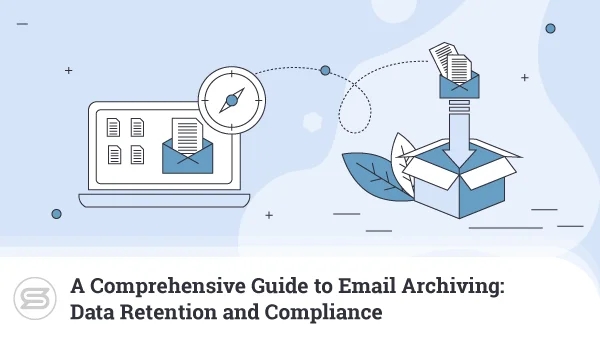Remember when people were saying that email is dead?
Yeah, so much for that. Email is not only still here, but it is holding the crown as the primary mode of communication for individuals and businesses alike. As such, it has become a focal point for cyber threats and data breaches. That’s why encryption is vital.
In this article, we’ll discuss tricks for securing communication and the importance of email encryption. We’ll provide valuable strategies and explain the most popular ones on the market.
Let’s go:
Introduction to Email Encryption
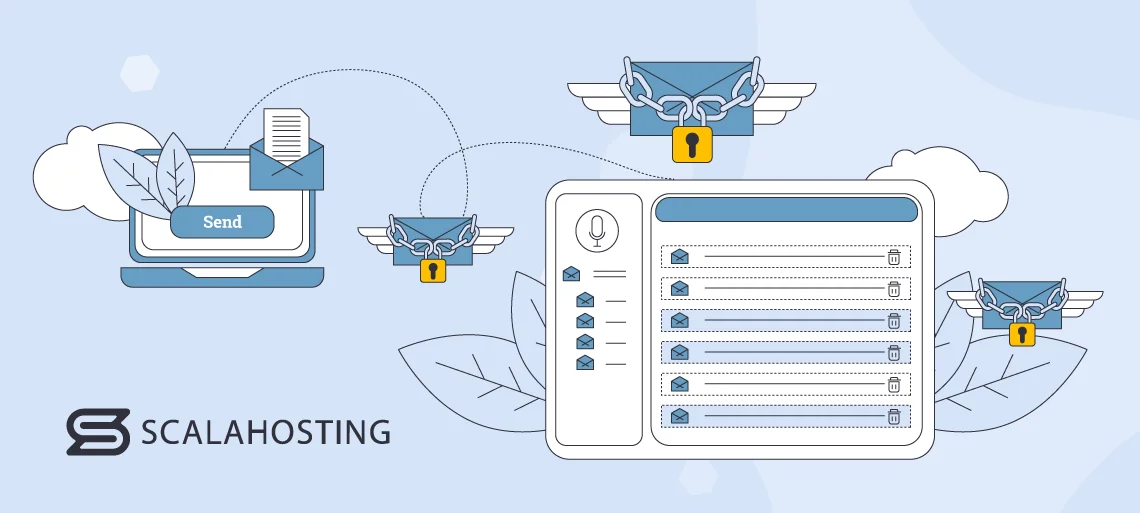
At its core, encryption is the process of encoding the content of an email to secure it from unauthorized access. This practice safeguards the information exchanged between the sender and recipient, preventing malicious actors from intercepting and exploiting sensitive data.
There are two types you need to know about:
- encryption in transit (such as TLS), which protects emails while they travel between mail servers and devices,
- encryption at rest, which secures stored messages on mail servers or devices from unauthorized access.
Both forms play a crucial role in maintaining the integrity and confidentiality of information throughout its lifecycle.
Why Email Encryption Matters
If your emails are not encrypted, you will expose sensitive information to a range of risks, including interception, unauthorized access, and data manipulation. The lack of protection will make your data susceptible to cybercriminals aiming to exploit vulnerabilities in communication channels.
There are various potential consequences. From financial losses and reputational damage to legal repercussions, the aftermath of a data breach can be catastrophic for individuals and organizations alike. By safeguarding your email communication and employing encryption, you ensure that sensitive information remains protected. This mitigates risks and builds trust between businesses and clients.
How Email Encryption Works
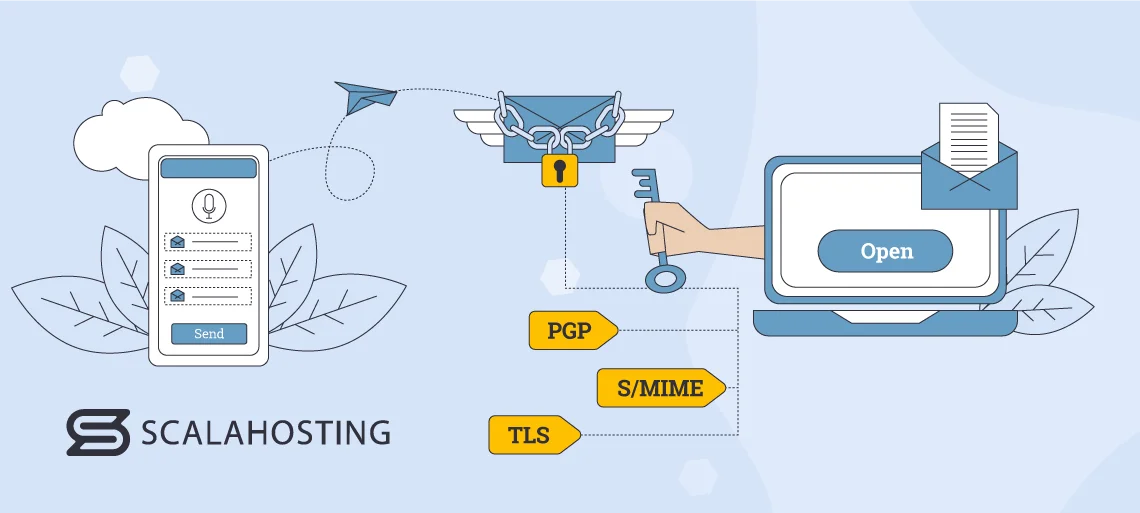
Email encryption involves using encryption keys, algorithms, and ciphers to secure email content and protect it from unauthorized access. Each component plays a crucial role in the overall process.
Let’s check them out:
There are two types of encryption keys – asymmetric and symmetric. The former includes a public key used for encryption, which can be freely distributed; plus, a private key is kept secret and used for decryption. In symmetric encryption, a single shared key is used for both encryption and decryption.
Another option – encryption algorithms. Those mathematical procedures or rules dictate how data is transformed from its original form (plaintext) into an encoded one (ciphertext). They can also be symmetric and asymmetric. Common symmetric encryption algorithms include AES (Advanced Encryption Standard), which is widely recommended today. Older algorithms such as DES and 3DES are considered obsolete and should be avoided for new deployments.
You can also go for ciphers. They are systematic methods for encrypting or decrypting information. Ciphers feature a set of rules or an algorithm that transforms plaintext (readable data) into ciphertext (encoded data) and vice versa. There are various types, broadly categorized into symmetric, asymmetric (or public-key), and hybrid. A good example of a symmetric cipher is AES. It divides data into fixed-size blocks and encrypts each block individually using the shared key. RSA, on the other hand, is an asymmetric cipher. It uses the mathematical properties of large prime numbers to facilitate secure key exchange and encryption.
Benefits of Email Encryption
There are several benefits of email encryption:
- Ensuring confidentiality of sensitive data – whether it’s personal information, financial details, or business-critical data, encryption provides a secure channel for communication.
- Minimizing risks of interception – encryption is crucial for preventing cybercriminals from accessing sensitive information while it travels across networks.
- Building trust with clients and partners – focusing on the confidentiality of shared information, fostering stronger relationships.
- Adhering to security policies – most companies have strict policies for maintaining a secure communication environment.
- Protecting intellectual property or proprietary information – email encryption safeguards against unauthorized access and protects valuable assets from being compromised or misused.
In short, email encryption should be the main focus of your cybersecurity strategy. It provides an additional layer of protection that is vital for safeguarding sensitive and confidential information shared in digital communication.
Types of Email Encryption
There are numerous types of email encryption, but the most widely deployed in practice is transport-level encryption (TLS), as it works automatically between most email providers. End-to-end encryption is stronger but less common due to setup complexity. It ensures that only the intended recipient can decrypt and read the email. In contrast, transport-level encryption, another common type, secures the communication channel between the sender and the email server.
S/MIME is also a widely adopted standard for securing email communication. It involves the use of digital certificates to authenticate the sender and encrypt the email content. It is an excellent solution for both businesses and individuals.
For fans of open-source options, PGP encryption provides users with a high level of control over the encryption process.
But which is the best one?
This depends entirely on the size of your company or business and its individual needs. We advise looking into all options before choosing.
Implementing Email Encryption
In order to efficiently implement encryption, you’ll need to integrate it seamlessly into existing email platforms. Your first step is to clearly define the scope and requirements for encryption within your organization. Identify the types of data you exchange, such as personally identifiable information (PII), financial data, or intellectual property. That will help you choose the best encryption type. It is always a good idea to consider well-established encryption algorithms like AES for symmetric and RSA for asymmetric encryption in case you really don’t know where to begin.
Third-party encryption services and plugins offer a customizable approach for organizations and users seeking specialized encryption features or additional layers of security. Popular tools include Virtru, ProtonMail, and Mailvelope. All are user-friendly and reliable options, even for non-technical users.
Challenges and Considerations
One of the ongoing challenges in implementing email encryption is finding the right balance between security and usability. You will need to make sure that encryption measures do not hinder the user experience.
Another thing to consider is that different email clients may have varying levels of support for encryption standards and protocols. Make sure to check those thoroughly when choosing a service.
You’ll also need to manage encryption keys effectively, as this is critical for the security of encrypted communications. You must keep key distribution, storage, and rotation away from those with unauthorized access. A good idea is to regularly update and rotate encryption keys, especially in asymmetric encryption scenarios.
And last but not least – implementing and maintaining robust email encryption solutions may involve software licenses, infrastructure, and ongoing support costs. Set aside a suitable sum when calculating your company’s budget.
Public Key Infrastructure (PKI)
Public Key Infrastructure (PKI) is a comprehensive system of hardware, software, policies, and standards that provides a framework for secure communication and electronic transactions. It utilizes asymmetric cryptography, relying on pairs of public and private keys.
The public keys are often embedded in digital certificates. Those are issued by trusted entities known as Certificate Authorities (CAs) and include information about the key owner, the public key, and the CA’s digital signature.
Users who want to send an email obtain the recipient’s public key from their digital certificate. They need it to encrypt the content, ensuring that only the recipient’s private key can be used to open it.
Mobile Email Encryption
We’ve all seen the “Sent from iPhone” message at the end of an email way too often, so it’s safe to say more people communicate on the go. Using encryption on your mobile device is a must these days. The main reason, other benefits aside, is minimizing the risk of interception in public or unsecured networks.
There are several ways you can protect your data when emailing from your phone:
- Enable device encryption – all modern mobile operating systems have built-in encryption. On iOS, this is enabled by default when you set a passcode. On Android, most devices use File-Based Encryption. You can enable them from the Settings menu.
- Employ end-to-end encryption – it will protect your device against interception during email transmission.
- Avoid connecting to public Wi-Fi networks – public networks are vulnerable to hackers, and this hides a lot of risks for your data, so you should avoid them whenever possible.
- Frequently update your OS and email – this will ensure you have a version of the software that has addressed known vulnerabilities that could be exploited.
- Implement Mobile Device Management (MDM) – this provides enhanced control over device configurations, application permissions, and data protection.
Another good idea is to select well-established secure email apps with a track record of strong security practices. Popular ones include ProtonMail, Hushmail, and Tutanota.
Email Gateway Encryption
Email gateway encryption operates at the corporate level, providing centralized control over encryption policies. This approach ensures the consistent application of encryption standards and facilitates the management of security protocols.
Gateway encryption is also a vital part of Data Loss Prevention (DLP) strategies. It helps you identify risks and prevent the transmission of sensitive information through emails.
Other benefits include:
- Regulatory compliance – various industries and regions have stringent regulations mandating the protection of sensitive data, so you’ll need to be on your best behavior.
- Mitigating insider threats – by employing email gateway encryption, you’ll ensure that even authorized users cannot access sensitive information without proper rights.
- Simplified administration – administrators will be able to easily configure, update, and monitor encryption settings from a centralized console.
Interoperability and Standardization
Here’s the thing:
You can’t just encrypt one email and be done with it. You need to do it consistently, for which you’ll need to set encryption standards. Adopting said standards ensures that different systems and applications can communicate securely by adhering to a standard set of protocols.
You can use ones developed by organizations like the Internet Engineering Task Force (IETF). Through Request for Comments (RFCs), the IETF defines standards for internet-related protocols, including encryption. RFCs provide a reference for the development and implementation of encryption protocols, fostering a common language and framework. The main benefit for you is that you get continuously updated protocols to address emerging security threats.
Regulatory Compliance and Email Encryption
A good example of data regulation standards is GDPR. It is applicable in the European Union and mandates the protection of personal data. While it doesn’t explicitly require encryption, it emphasizes implementing appropriate technical and organizational measures for data security. One way to achieve it is via email encryption.
Health Insurance Portability and Accountability Act (HIPAA), on the other hand, strongly recommends encryption. The healthcare industry is very strict when it comes to protecting patient health information. This includes securing data transmitted via email to prevent unauthorized access.
In addition, the financial sector has its own requirements. It’s under regulations such as the Payment Card Industry Data Security Standard (PCI DSS), which requires encryption to protect financial transactions and sensitive customer data shared via email communications.
Email encryption safeguards confidential information by preventing tampering or modifications during transmission. It also mitigates the risk of unauthorized access. This aligns perfectly with the risk management aspect of compliance efforts.
Why Is Email Hosting Important
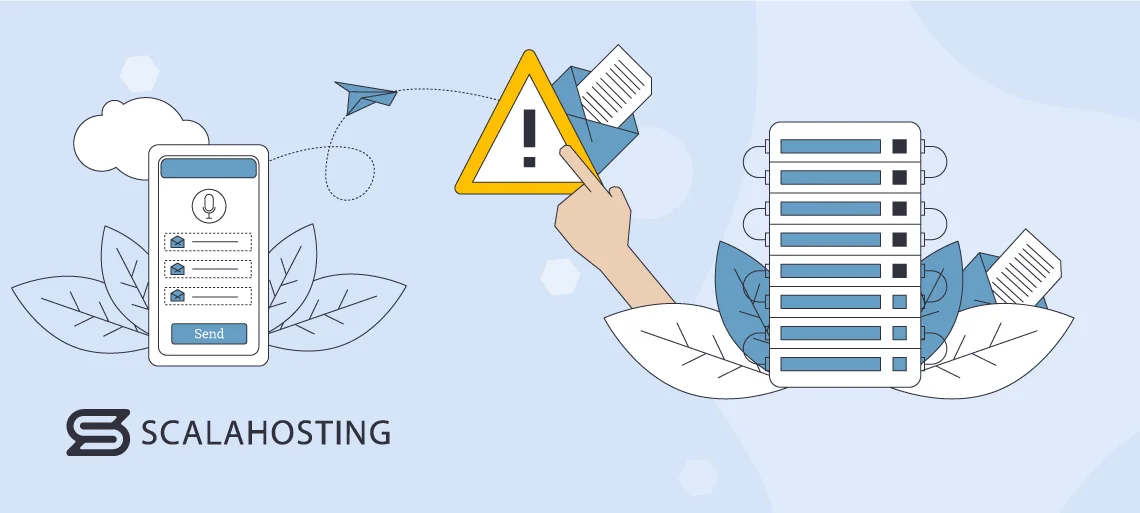
Email encryption is vital but not the only way to guarantee data security. Hosting also matters.
But what is email hosting?
It is a service that provides the infrastructure and resources needed to manage and operate email accounts associated with a domain. It allows individuals, businesses, and organizations to use custom email addresses with their own domain names. That way, they won’t have to rely on generic services, such as Gmail.
By choosing a good hosting service, you get storage space for emails, attachments, and other data. A vendor that enables scalability and flexibility will help you easily increase your capacity when it’s time to grow. You can also integrate collaboration tools such as calendars, contacts, and document sharing.
A reputable provider will also strive for high uptime and reliability, ensuring your email service is consistently available without disruptions. You will also reap the benefits of security and privacy features such as spam filtering, antivirus protection, and encryption to safeguard against cyber threats.
So, let’s sum up:
You get custom domain names, security features, collaboration tools, and scalability. In short, email hosting provides a tailored environment that goes beyond the capabilities of generic email services
Secure Business Email with ScalaHosting
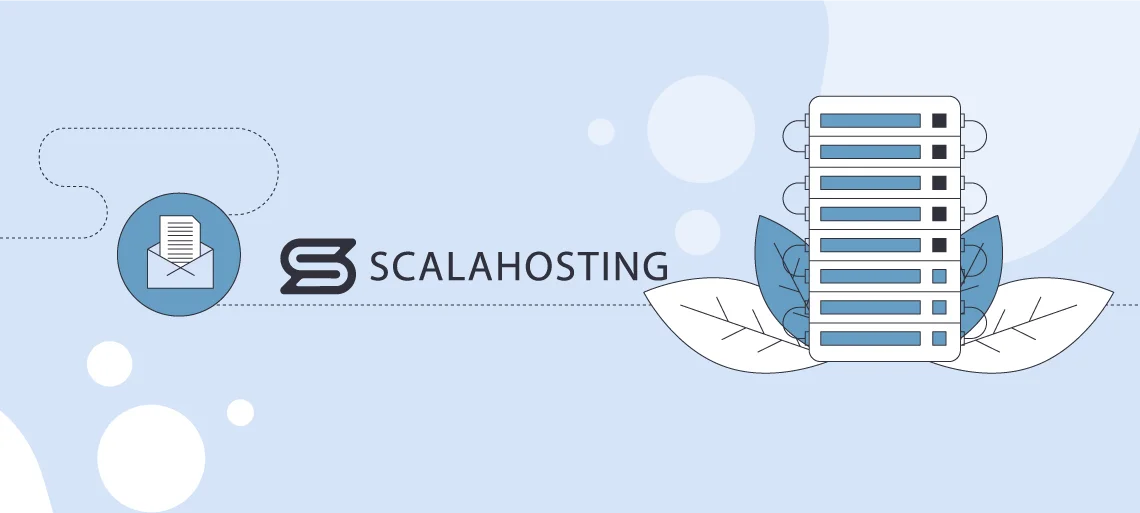
Strong encryption means little if your email platform can’t deliver messages reliably, protect against threats, or scale with your needs. That’s why ScalaHosting’s business email is built from the ground up for secure, professional communication.
- No Per-User Fees – add mailboxes as your team grows without paying more per head.
- Guaranteed Delivery – dedicated IP addresses, clean sender reputation, and proactive blacklist monitoring keep your emails where they belong.
- Enterprise-Grade Spam & Threat Protection – block phishing, malware, and spam before they reach your staff.
- Custom Domain Email – reinforce your brand identity with addresses that match your domain.
- Free, No-Downtime Migration – our experts move your mailboxes, messages, and attachments without interrupting your business.
- 24/7 Expert Support – real people who know email, ready to help any time.
Your email is the lifeline of your business. With ScalaHosting, you get security, deliverability, and freedom to grow — all in one managed solution.
Wrap Up
Email still is and, as it seems right now, will be the primary mode of professional communication for the foreseeable future. So, you’ll need to learn how to protect all the data you’re sharing via it. The benefits are numerous, spanning confidentiality and trust-building to saving money. Employing encryption keys, algorithms, and digital signatures can only do you favors.
But the most important takeout is:
Email encryption is not just a security measure; it’s imperative for safeguarding sensitive data and maintaining trust in an ever-connected world.
FAQ
Q: Is it a good idea to encrypt your email?
A: Еncrypting your email is a very good idea. This means you’ll be securing sensitive information transmitted, protecting it from interception, unauthorized access, and manipulation. Encrypting helps organizations comply with regulatory requirements, builds trust among stakeholders, and prevents data leaks.
Q: Can someone read an encrypted email?
A: When an email is encrypted, the information is encoded in a way that can only be deciphered by the intended recipient, who possesses the necessary decryption key. This ensures the confidentiality and privacy of the communication. To simplify, only the intended recipient will see your message.
Q: Can encrypted emails be hacked?
A: The effectiveness of email encryption depends on various factors, including the strength of the algorithm, the security of the encryption keys, and the overall implementation of the process. If you’ve implemented them all correctly, it is very challenging for someone to hack your email. However, no system is completely foolproof.
